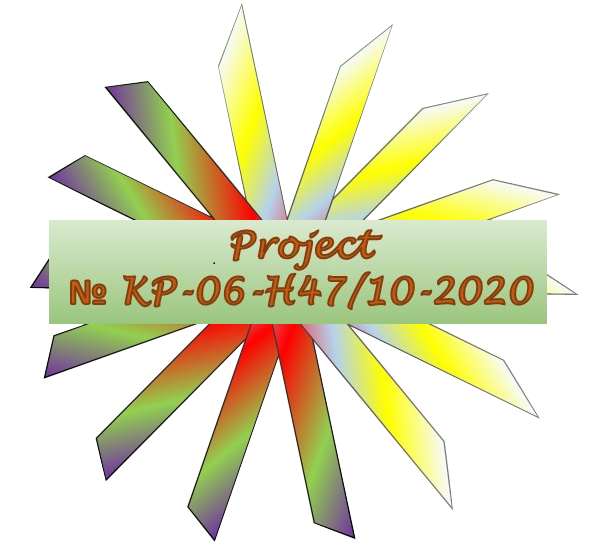Description of the results related to acquiring new knowledge or solving social problems
The expected results from the project implementation are the following:
• Demonstration of the ability to synthesize new ceramic pigments and new colours based on diopside-augite matrix by adding chromophore impurities;
• Determination of the parameters of synthesis, the type of impurity ions and concentration for the production of two-phase and single-phase pigments;
• Finding relationships between the type of the doping element and the structural and crystal-chemical characteristics;
• Demonstration or rejection of the use of waste materials for the synthesis of ceramic pigments;
• Finding new or modified optical and physical properties of new ceramics for other functional applications;
• Improvement of the quality of scientific work, increasing the publication activity of the group members, defending master’s theses (2) and PhD dissertation work (1) of students and doctoral students working on the subject.
Contribution to solutions of problems related to societal challenges
This project will definitely make a significant contribution to the search for solutions to environmental problems that are current and significant societal challenges. A major component of environmental pollution and disturbance of the ecological balance is the production of hazardous substances and waste. This drives research to find new technologies and methods for their use.
The development of new pigments aims to achieve saturated colours in a stable matrix by incorporating lower concentrations of chromophore elements that are potentially risky. The aim is to find solutions to significant problems arising from the accumulation of harmful and potentially hazardous toxic elements, such as petroleum refining catalysts and spent vanadium catalyst.
For example, for an oil refinery that processes 7,000,000 tonnes of oil per year, it uses between 50 and 100 tonnes/year catalyst. In petroleum refineries, many catalysts are used in processes such as catalytic cracking, catalytic reforming, hydrotreating, and also in the production of petrochemicals related to dealkylation processes. Three types of cracking catalysts are known – natural activated aluminosilicates, synthetic amorphous aluminosilicates and synthetic crystalline aluminosilicates. The first industrial reforming catalyst is MoO3 / Al2O3. The most widely used catalysts in the hydrodesulfurization processes are aluminum cobalt molybdenum and aluminum nickel molybdenum. For catalytic dealkylation of alkenes in the production of benzene and toluene, heterogeneous MoO3, CoO, NiO or Cr2O3 applied on Al2O3 catalysts are used.
In the contact process for manufacturing sulfuric acid vanadium catalysts is used. Consumption is between 5 and 6 tonnes per year, with spent vanadium catalyst being deposited. Therefore, one of the tasks in the project proposal is focused on the characterization and use of these waste materials for the synthesis of ceramic pigments.
An important focus of this project is the collaboration between the two organizations, which aims to develop universities and research institutions outside the capital Sofia, which is in line with the societal challenges of balanced research development and balanced distribution of scientific infrastructure.
Increasing the research capacity of the applying and/or partner organizations, as well as improving team members qualification
The members of the scientific team will enrich their professional and scientific experience in the subject, as well as in the use and various modern methods of characterization of the materials.
Joint scientific work with our and foreign researchers will have a positive impact on the career development of the members of the working team.
The team includes 3 students, one PhD student and one Post Doc fellow. The work on the project will significantly contribute to their educational, scientific and career growth. They will be given the opportunity to work in various analytical laboratories using specialized software, discussing results and data. They will exchange experience in planning and conducting experiments, thus accumulating a large amount of experimental and theoretical material for their future scientific work. They will be introduced to modern methods and equipment, which will build them as prospective specialists.
The planned purchase of new equipment is for the needs of the Synthesis Lab at the University of Ruse. This will contribute to the synthesis of new materials and increase the level of scientific work, in accordance with the requirements and standards of modern world scientific research (in accordance with the priorities in National strategy for development of scientific research in the Republic of Bulgaria 2017 – 2030).
The results of the project will be presented at national and international scientific forums and conferences, which will further increase the professional experience of the team members. More students and laboratory assistants will be attracted to carry out scientific work, analyzes and experiments during the period of work on the project. This will engage young people in the long run and will kick-start their future scientific and creative development. The study will be supported by various training activities, including seminars, thematic courses and specialized visits to the centers of expertise.
The seminars will enable young members of the group in present their results to a wide audience.
Specialized working visits will allow all members of the group to feel the academic atmosphere of other laboratories. During these visits, they will meet with leading experts in the area of interest and will share experiences.
It is expected that the qualification of the members of the team will be improved: PhD student Tsvetalina Ibreva successfully defending her dissertation; Assistant Professor Iliana Nikolova to prepare for the upcoming habilitation and students Boyan Andreev, Gennadi Yankov and Nikola Kuvandzhiev to prepare their diploma works, based on the research on the subject of the project.
The publishing activity and the quality of publications in both organizations University of Ruse and IMC-BAS are expected to increase.
